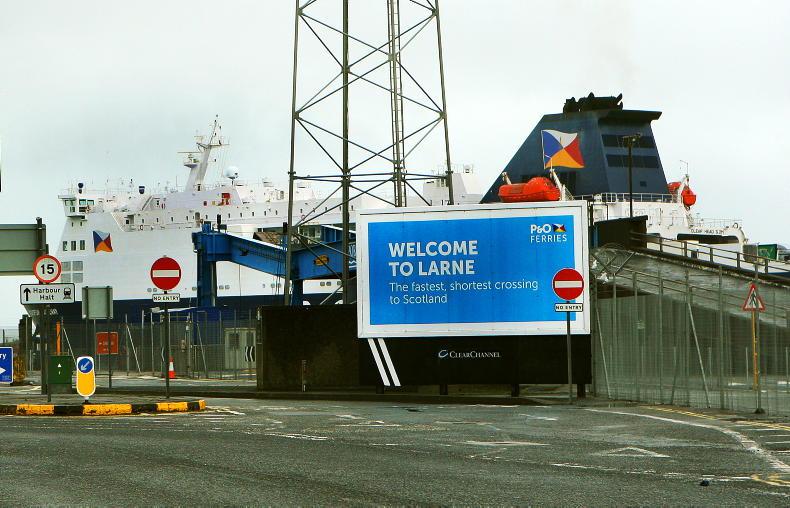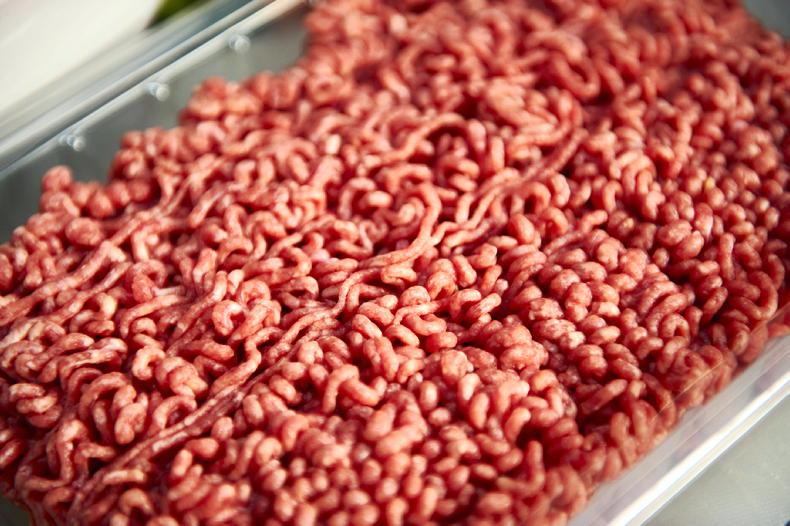After seven weeks, the whole debate on Brexit is centred on the cost of lorries returning empty from Britain and the tendency to avoid the land bridge on trips to the continent.
Sending goods of animal or plant origin to Britain hasn’t been a problem so far, but we need to be mindful that that will change from 1 April.
The UK will then move to full implementation by 1 July.
Island of Ireland impact
The EU, including both jurisdictions on the island of Ireland, moved to implement full controls on 1 January.
This was a particular issue in Northern Ireland (NI), because very few British businesses were ready and virtually none appreciated that full controls would be effective in NI as they are elsewhere in the EU.
Until it happens, we cannot be sure of how disruptive this will be
There are short-term exceptions for retailers being given a derogation for veterinary health certificates until 1 April and, in the case of goods such as fresh manufactured meat (sausages), there is an exemption until 1 July.
Disruptive to NI retail
After these complete, then NI importers, including large supermarkets such as Asda and Sainsbury's, will have to either find a way of having veterinary health certificates accompany each consignment or make alternative supply arrangements within the EU.
A further option would be to set up a distribution point on the island of Ireland to take bulk consignments from Britain with one health certificate covering all.

Products of animal and plant origin are now subject to EU controls when entering Northern Ireland from Britain. \ Houston Green
The preferred option for business in NI would be to have a permanent arrangement where goods going into an end user such as a supermarket would be exempted in the longer term under a trusted trader arrangement.
This would have to be negotiated in the technical committees set up to implement the EU-UK agreement and there is no certainty that EU agreement can be secured for this.
Application to Irish exports after 1 April
After 1 April, Irish exports to Britain will need a health certificate and from 1 July they will be subject to inspections in the same way that imports from Britain to the island of Ireland are currently.
Until it happens, we cannot be sure of how disruptive this will be.
The best hope is that Irish exporters to the UK are also likely to have been exporting to the rest of the world and will therefore be familiar with having these controls applied to business with the UK.
That will only become apparent after a period of the UK implementing full controls.
Veterinary deal solution
The ideal solution for trade in goods of animal and plant origin both ways would be for the EU and UK having a veterinary alignment agreement.
This may be politically sensitive in the UK and there may also be a hardening in Brussels.
However, this is what works for Norway and Switzerland, two countries outside the EU but having a close relationship.
The UK at present would also meet that criteria, although, of course, this may change in time if the UK chooses to diverge from EU standards.
Even that issue could be overcome by having a withdrawal notice period in the agreement and reverting to where we are at present, even though there is little appetite in business for it.
Read more
Brexit bureaucracy knock-on effects
Making Brexit work
After seven weeks, the whole debate on Brexit is centred on the cost of lorries returning empty from Britain and the tendency to avoid the land bridge on trips to the continent.
Sending goods of animal or plant origin to Britain hasn’t been a problem so far, but we need to be mindful that that will change from 1 April.
The UK will then move to full implementation by 1 July.
Island of Ireland impact
The EU, including both jurisdictions on the island of Ireland, moved to implement full controls on 1 January.
This was a particular issue in Northern Ireland (NI), because very few British businesses were ready and virtually none appreciated that full controls would be effective in NI as they are elsewhere in the EU.
Until it happens, we cannot be sure of how disruptive this will be
There are short-term exceptions for retailers being given a derogation for veterinary health certificates until 1 April and, in the case of goods such as fresh manufactured meat (sausages), there is an exemption until 1 July.
Disruptive to NI retail
After these complete, then NI importers, including large supermarkets such as Asda and Sainsbury's, will have to either find a way of having veterinary health certificates accompany each consignment or make alternative supply arrangements within the EU.
A further option would be to set up a distribution point on the island of Ireland to take bulk consignments from Britain with one health certificate covering all.

Products of animal and plant origin are now subject to EU controls when entering Northern Ireland from Britain. \ Houston Green
The preferred option for business in NI would be to have a permanent arrangement where goods going into an end user such as a supermarket would be exempted in the longer term under a trusted trader arrangement.
This would have to be negotiated in the technical committees set up to implement the EU-UK agreement and there is no certainty that EU agreement can be secured for this.
Application to Irish exports after 1 April
After 1 April, Irish exports to Britain will need a health certificate and from 1 July they will be subject to inspections in the same way that imports from Britain to the island of Ireland are currently.
Until it happens, we cannot be sure of how disruptive this will be.
The best hope is that Irish exporters to the UK are also likely to have been exporting to the rest of the world and will therefore be familiar with having these controls applied to business with the UK.
That will only become apparent after a period of the UK implementing full controls.
Veterinary deal solution
The ideal solution for trade in goods of animal and plant origin both ways would be for the EU and UK having a veterinary alignment agreement.
This may be politically sensitive in the UK and there may also be a hardening in Brussels.
However, this is what works for Norway and Switzerland, two countries outside the EU but having a close relationship.
The UK at present would also meet that criteria, although, of course, this may change in time if the UK chooses to diverge from EU standards.
Even that issue could be overcome by having a withdrawal notice period in the agreement and reverting to where we are at present, even though there is little appetite in business for it.
Read more
Brexit bureaucracy knock-on effects
Making Brexit work







 This is a subscriber-only article
This is a subscriber-only article











SHARING OPTIONS: